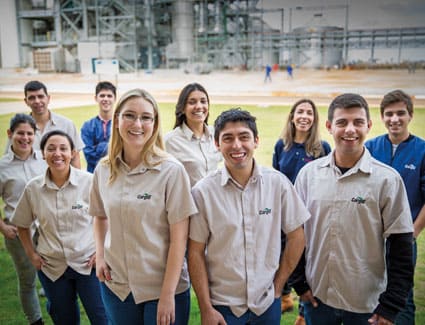Meeting colleague, community and farmer needs in Ukraine
Read Time: 7 minutes
July 27, 2022
Updated: Feb. 24, 2023
The people of Ukraine are living an unthinkable and horrifying reality. Since their country was invaded in February 2022, many have lost their lives, their families, their homes — everything.
More than 13 million Ukrainians have been displaced since the invasion, according to the United Nations Refugee Agency. The implications for food and agriculture are far-reaching:
- Before the invasion, Ukraine produced enough food to feed 400 million people per year, according to the World Food Programme.
- Since the invasion, Ukraine has suffered $28.3 billion in agricultural losses, according to the Food and Agriculture Organization of the United Nations.
- Crop exports in 2023 are projected to be half of what was shipped in 2021 before the invasion.
Through Cargill’s 158 years, two things have remained constant: We always put people first, prioritizing our employees’ safety, and we do everything we can to nourish the world.
That is why Cargill has invested an initial $40 million to support humanitarian relief efforts in Ukraine and in the broader region. Learn how that support extends to Ukrainian colleagues, communities and farmers — and how we’re helping to keep food flowing around the world.
Caring for colleagues
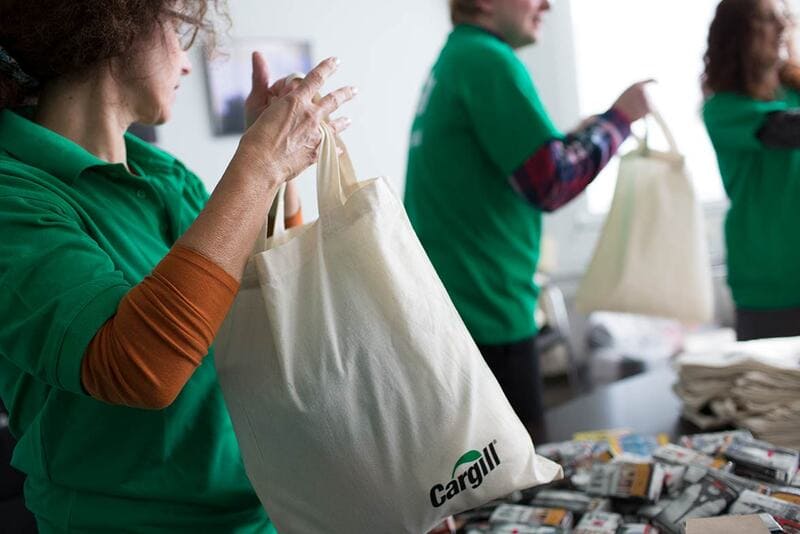 Cargill continues to provide support for employees inside and outside Ukraine.
Cargill continues to provide support for employees inside and outside Ukraine.
Ensuring our employees are safe and cared for is paramount. We continue to provide support for employees inside and outside Ukraine.
- Cargill’s Employee Disaster Relief Fund — created in 2020 to support our colleagues around the world during times of catastrophe and disaster — is providing critical emergency funds to all Ukrainian employees. These urgent financial relief grants support basic needs, such as housing, childcare, food, clothing, transportation and utilities.
- We created the Ukraine Support Hub, a global relief center to support displaced colleagues and their families. Based in Poland, the hub helps employees who have evacuated to other countries with basic needs like housing, medical care, travel, immigration, employment, finances and children’s education.
- Our Stronger Together app for colleagues provides a self-help tool that connects those who are offering support with those who are seeking it.
- We also provided a winter support package for employees to mitigate hardships during the coldest time of the year.
“I am proud to work in a company that cares about their employees like this.”
Supporting the wider community across Ukraine
To support people across Ukraine, we work with local and long-term NGO partners that deliver vital aid in Ukraine and neighboring countries.
This includes focusing our humanitarian efforts on several global partners and local organizations supported by employees and Cargill Cares Councils — employee-led volunteer groups partnering locally in European countries to support relief efforts across the region.
- In Ukraine, Cargill works with national and international NGOs to provide humanitarian assistance and supports 28 aid projects via local organizations — spanning emergency search and rescue, medical and rehabilitation equipment, emergency housing, support for vulnerable people and education.
- Outside Ukraine, Cares Councils provide support through financial contributions, food donations and employee volunteering in countries such as Belgium, Bulgaria, France, Germany, Hungary, Norway, Poland, Romania and Switzerland.
A central point of relief efforts
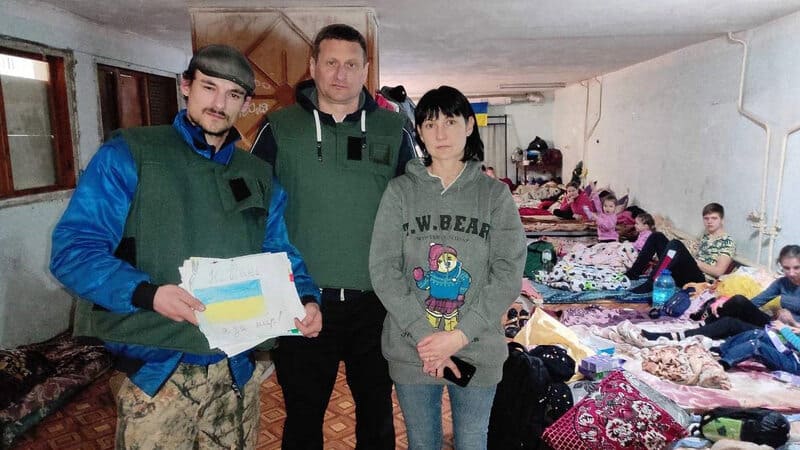 Cargill helped start the Kyiv City Charity Foundation Food Bank in Ukraine in 2012. Today, the food bank is a central point of relief efforts. © Copyright Kyiv City Charity Foundation Food Bank
Cargill helped start the Kyiv City Charity Foundation Food Bank in Ukraine in 2012. Today, the food bank is a central point of relief efforts. © Copyright Kyiv City Charity Foundation Food Bank
When Cargill helped start Ukraine’s Kyiv City Charity Foundation Food Bank in 2006, no one could have predicted the humanitarian crisis unfolding today. The food bank continues to be a central point of relief efforts, at one point serving more than 3,000 people per day.
Cargill also supports the European Food Banks Federation (FEBA), which is providing support to food banks in Ukraine, Hungary, Moldova, Poland, Romania and Slovakia to grow their capacity to serve Ukrainian refugees. Cargill supports FEBA and its broad network of more than 300 food banks across 30 European countries.
“This is a real-life example of why and how we invest in local food security. We lean on our strong partnerships and build networks that support people where it is most needed — not only in times of crisis but every day.”
Providing cash assistance and meals to thousands of Ukrainians
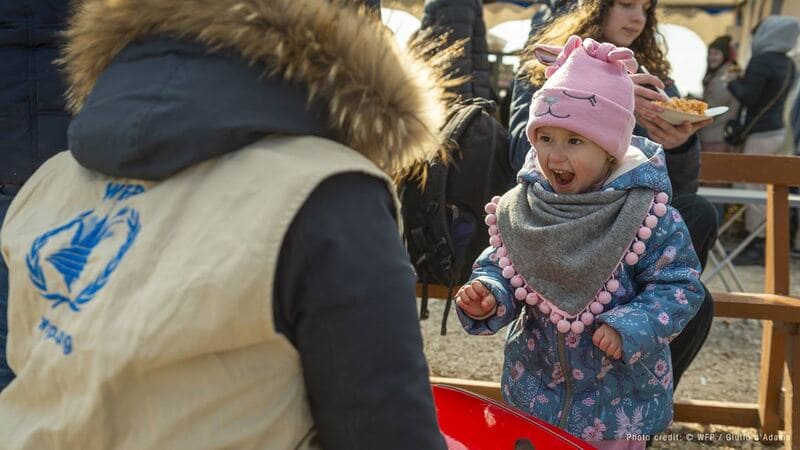 To respond to food security needs, Cargill has increased its humanitarian support to the United Nations World Food Programme (Photo credit: © WFP / Giulio d'Adamo)
To respond to food security needs, Cargill has increased its humanitarian support to the United Nations World Food Programme (Photo credit: © WFP / Giulio d'Adamo)
The invasion of Ukraine has had drastic food security consequences for people inside the country and for those around the world who rely on the country’s grain.
To respond to these needs, Cargill has increased its humanitarian support for the United Nations World Food Programme’s operations in Ukraine. The result: providing 35,000 Ukrainians with cash for one month and 55,000 people in Kharkiv with food assistance for two months.
Helping war victims through a state-of-the-art rehabilitation center
 Cargill supports Superhumans, an NGO that will launch a state-of-the-art war victim rehabilitation center for adults and children in Lviv, Ukraine. (Photo credit: Superhumans)
Cargill supports Superhumans, an NGO that will launch a state-of-the-art war victim rehabilitation center for adults and children in Lviv, Ukraine. (Photo credit: Superhumans)
The conflict in Ukraine also has left thousands temporarily or permanently impaired.
To aid their recovery, Cargill supports Superhumans, an NGO that will launch a state-of-the-art war victim rehabilitation center for adults and children in Lviv. The center is expected to treat 2,800 patients per year when it opens in mid-2023.
Supporting farmers in ‘the breadbasket of the world’
The crisis in Ukraine is impacting hundreds of millions of people around the globe. Among them are Ukrainian farmers, who need additional support to produce the food the world depends on.
At Cargill, we are proud to have worked alongside Ukrainian farmers for more than 30 years — and to continue supporting them.
Helping clear Ukrainian farmland of dangerous landmines
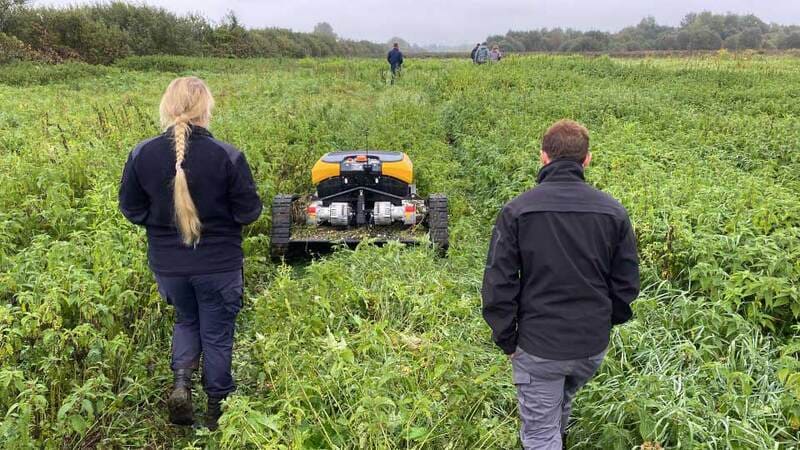 Ukraine has become the most mined country in the world. Cargill is working with a global landmine clearance NGO, The HALO Trust, to begin removing landmines from Ukrainian farmland.
Ukraine has become the most mined country in the world. Cargill is working with a global landmine clearance NGO, The HALO Trust, to begin removing landmines from Ukrainian farmland.
Ukraine is known as the breadbasket of the world. Its crops feed families from China to Turkey to Egypt. It is home to some of the most fertile soil in the world.
Today, that soil is contaminated by landmines. Experts say at least 40% of the country — an area larger than the United Kingdom — needs to be searched and cleared, making it the most mined country in the world. Farmers are getting injured — or worse — just trying to grow the world’s food.
That is why Cargill is working with a global landmine clearance NGO, The HALO Trust, to begin removing mines from Ukrainian farmland. HALO’s mine clearance teams use specialized tractors that not only detect and remove mines but also minimize soil movement to maintain healthy soil for the restored farmland. So far, HALO teams have helped make 105 acres of land safer, benefitting tens of thousands of Ukrainians, according to the organization.
Half of all mine accidents in Ukraine are caused by mines on roads and in agricultural fields. So, Cargill is also supporting The HALO Trust’s work to educate farmers and agricultural workers about how to identify threats and report dangerous objects.
Getting Ukrainian farmers the seeds they need
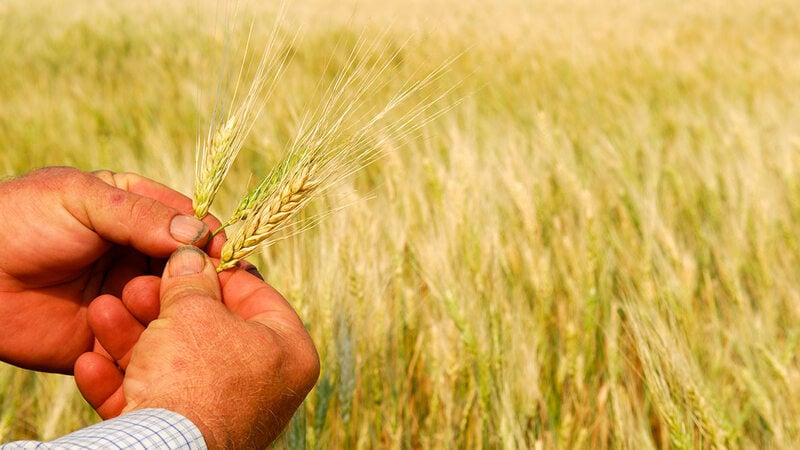 Cargill has worked with World Central Kitchen to support its seed pilot project to buy sunflower and corn seeds for Ukrainian farmers.
Cargill has worked with World Central Kitchen to support its seed pilot project to buy sunflower and corn seeds for Ukrainian farmers.
Cargill is also working alongside Ukrainian farmers to help them continue growing the world’s food and to support their livelihoods.
We have worked with World Central Kitchen, one of our longstanding disaster relief NGO partners, to support its seed pilot project to buy sunflower and corn seeds from a Ukrainian supplier and distribute them to mid-size farmers in the areas most impacted by the war. By investing in the global humanitarian organization’s program, Cargill is helping Ukrainian farmers produce the food the world depends on — and re-establish their livelihoods at the same time.
Keeping food moving around the globe
When it comes to food supply and food security, the invasion of Ukraine has had far-reaching consequences. A total of 44 million people in 38 countries are on the brink of famine, according to the UN World Food Programme. Millions of people in low- and middle-income countries depend on Ukraine’s wheat.
At Cargill, we have continued to move food across borders and support urgent food security needs. This includes providing a $10 million grant to World Food Program USA for the UN World Food Programme to address immediate and long-term food security efforts in Ukraine and countries impacted by supply chain disruptions.
Moving food through the Black Sea
 Hundreds of millions of people around the world depend on food to move through the Black Sea corridor. Cargill is transporting grain by sea and has resumed origination activities for new crops.
Hundreds of millions of people around the world depend on food to move through the Black Sea corridor. Cargill is transporting grain by sea and has resumed origination activities for new crops.
Hundreds of millions of people around the world depend on food to move through the Black Sea corridor. But during the initial days of the invasion, Ukraine and neighboring countries were unable to safely move food through this important corridor.
In July 2022, Ukraine and the Russian Federation reached an agreement, brokered by Türkiye and the United Nations, to open a safe shipping corridor through the Black Sea that allowed Ukraine to resume exports by sea. To support Ukrainian farmers and our global customers, Cargill restarted transporting grain by sea and resumed origination activities for new crops.
Bringing food aid to other impacted countries
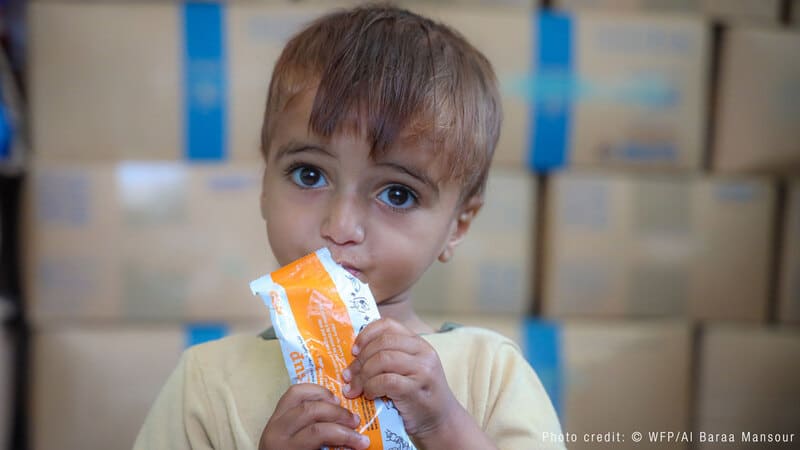 Cargill has partnered with World Food Program USA to support the UN World Food Programme's humanitarian operations and provided the equivalent of 2 million meals in Yemen and Somalia, where the invasion of Ukraine has worsened existing humanitarian crises. (Photo credit: © WFP/Al Baraa Mansour)
Note: Cargill has partnered with WFP USA to support WFP.
Cargill has partnered with World Food Program USA to support the UN World Food Programme's humanitarian operations and provided the equivalent of 2 million meals in Yemen and Somalia, where the invasion of Ukraine has worsened existing humanitarian crises. (Photo credit: © WFP/Al Baraa Mansour)
Note: Cargill has partnered with WFP USA to support WFP.
The rise in global food and fuel prices caused by the invasion of Ukraine has worsened existing humanitarian crises, too.
That is why we partnered with World Food Program USA to support the United Nations World Food Programme’s humanitarian operations and to provide the equivalent of 2 million meals in Yemen and Somalia, helping WFP to scale its food and nutrition assistance to reach more people.
In Madagascar, where skyrocketing fertilizer and fuel prices have worsened food security in this red seaweed-producing country, we partnered with local supplier Ocean Farmers to donate rice, a staple food. Together, we are distributing 50,000 kg (or more than 110,000 pounds) of rice to more than 2,000 red seaweed producers and impacted households in seaweed production villages.
For the latest information on our operations in Eastern Europe, read our latest statement.
More stories
More about Cargill
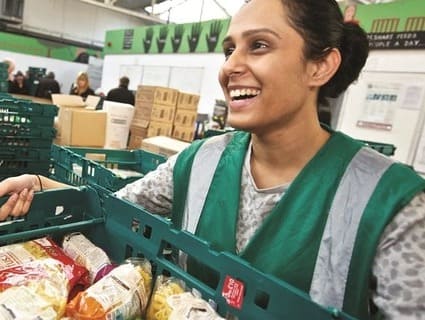
5 reasons why food banks matter
We asked food banking partners around the world what they wanted you to know. Here’s what they said.
